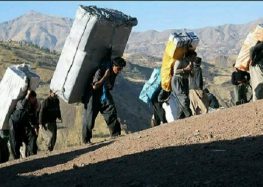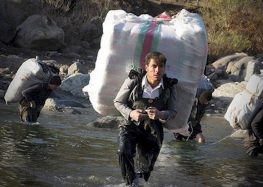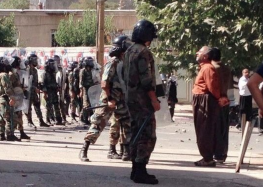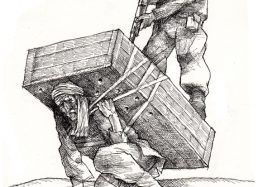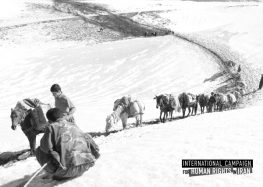Prominent Civil Rights Activists Urge Iran’s Parliament to Ban Use of Deadly Force Against Border Couriers
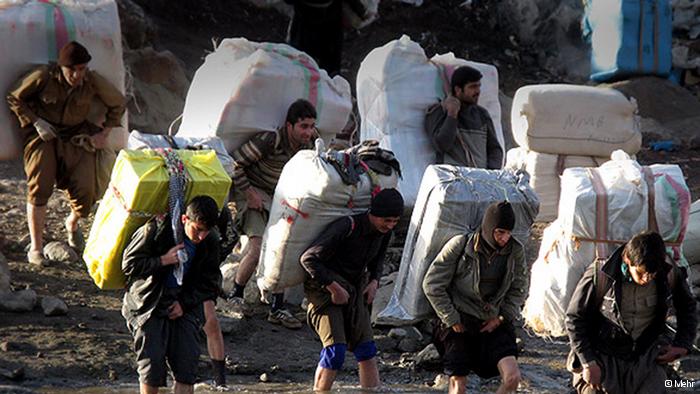
The killing, by border guards, of another kulbar—the Persian word for the border-crossing couriers who transport illegally imported goods into Iran—has prompted 250 Iranian civil rights activists to demand that Parliament implement measures to protect the downtrodden laborers.
“Shared widely on social media, images of an innocent young man’s body on the ground next to his load of cigarette boxes are heart-wrenching for every human being,” said the activists in a joint statement issued on June 18, 2017, a copy of which was obtained by the Center for Human Rights in Iran (CHRI).
“While deeply concerned and extremely sickened by the violent treatment against the kulbars, we call on the people, civil rights activists, and members of Parliament to end their indefensible silence and demand that the authorities be held accountable for their un-Islamic and unlawful actions,” added the statement.
The activists were reacting to a graphic online report by the Kurdistan Human Rights Network (KHRN) about the death of Sirvan Azizi, a kulbar killed by a bullet shot from close range by a border guard near a village close to the city of Sardasht, West Azerbaijan Province, on June 14.
Kulbars and their beasts of burden are often shot by border guards as they navigate narrow paths littered with landmines from the Iran-Iraq war (1980-88), as well as harsh mountain terrain and climate conditions.
To date, at least 15 kulbars have been killed in 2017 by border guards or avalanches, according to the KHRN report.
According to another report by KHRN, at least 92 kulbars were killed in 2016, a 27 percent increase compared to the previous year. Forty of the victims were killed by border guards.
Kulbars are mostly active in the mountainous border region between the towns of Qasr-e Shirin and Khoy along Iran’s northwestern borders with Iraq and Turkey. This geography spans the provinces of Kermanshah, Kurdistan, and West Azerbaijan.
The region is predominantly populated by ethnic Iranian Kurds, and is marked by a general dearth of economic infrastructure and development, resulting in high rates of poverty and unemployment.
Kulbars are forced into the dangerous work out of necessity. High unemployment has forced them to brave the elements and conduct unofficial cross-border trade between Iran and Iraq for minimal income.
Except for the 8,000-10,000 kulbars registered in the cities of Sardasht and Piranshahr, there are no official numbers of how many kulbars live and work in Iran because many operate without permits.
Until recently, the increasing number of kulbars killed while on the job went mostly unnoticed by the Iranian population.
However, the rise of the internet and social media in Iran, combined with the determined efforts of civil rights groups, has resulted in the kulbars’ dire situation being thrust into the public eye.
During their perilous cross-border journeys carrying goods on their backs or on mules, the kulbars must not only survive mine fields and natural dangers, said the activists’ statement, “but also bullets fired by soldiers whose blind shootings cause many innocent people to die or sustain injuries.”
The statement was signed by prominent Iranian activists including Saeed Madani, Azar Mansouri, Fariborz Raisdana, Habibollah Peyman, Jalal Jalalizadeh, Adnan Hassanpour, Alireza Rajaei and Mohammad Saleh Nikbakht.
One June 18, activists launched a twitter storm using the hashtag #kurdishlivesmatter to direct public attention to the kulbars’ plight.
“A kulbar’s share of life: Carrying a heavy load along impassible terrain and mine fields before taking a hot lead bullet in the chest,” tweeted former political prisoner Amir Amirgholi.
“If bullets don’t take kulbars’ lives, the snow, freezing weather and deadly valleys will,” tweeted a Kurdish user.
Parliament’s Response
The Entekhab newspaper reported on June 18 that four MPs from Iran’s western border regions—Rasoul Khezri, Ghaseem Osmani, Jalal Mahmoudzadeh and Abdolkarim Hosseinzadeh—had formally complained about the issue to President Hassan Rouhani and the Interior Ministry.
“The authorities’ lack of attention to the kulbars’ situation has resulted in several deaths and injuries along the border despite a letter from 153 legislators demanding the situation along the border be improved,” said Khezri, who represents the cities of Sardasht and Piranshahr in West Azerbaijan.
Heshmatollah Falahatpisheh, a MP from Eslamabad-e Gharb, Kermanshah Province, also told the reformist paper: “Kulbars are an oppressed group. The ideal solution would be to take away the conditions that create the need for such a profession. But until we get to an acceptable economic situation in the western border areas, we cannot expect miracles.”
“I believe the situation with the kulbars is exaggerated in the overall trafficking problem,” he added, implying that too many resources are being directed towards fighting them. “I am not denying that the kulbars deserve some criticism, but they are only responsible for 10 percent of the contraband trade,” he said.
Falahatpisheh noted that out of every billion tomans ($308,000 USD) generated from illegal goods trafficking in Kermanshah Province, only nine million tomans ($2,770 USD) could be attributed to trade conducted by kulbars.
About a month after avalanches killed six kulbars while they were carrying goods across the Iran-Iraq border near Piranshahr in February 2017, Parliament sent a fact-finding team to the region on March 8, 2017.
Shortly before, a teenage kulbar had died of frostbite along the same trade route, according to Mohammad Danesh, a civil rights advocate who spoke with CHRI in March 2017.
“There are almost no factories or other job opportunities” for the people of the region “and therefore they have no choice but to work as kulbars and transport trade goods through difficult, mountainous terrain,” he said.
Khezri, the MP representing Sardasht and Piranshahr, told the Iranian Students’ News Agency on March 8 that the fact-finding team would relay the kulbars’ demands to Tehran.
The demands include: social security, unemployment, disability benefits, a border trade cooperative, asphalt pavement on trade routes, and directing funds from border tariffs towards local development projects.
A report on the team’s findings and recommendations has also been submitted to the parliamentary National Security Affairs Committee to add to the debate on the situation of kulbars. To date, its findings have not been made public.
In August 2012, CHRI published a briefing paper on kulbars titled, “Dangerous Borders: Documenting the Killings of Couriers in Iran’s Western Provinces.”
The report called on the Iranian government to stop border guards from using lethal force against the laborers and provide them legal status. The briefing also provides a list of recommendations, including training border security officials to adopt clear policies to halt unlawful and unnecessary killings.

